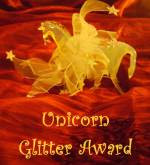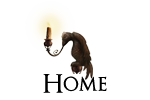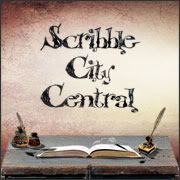
I may be cursed with the Demon Beast of Depression, but I think, having watched
Terry Pratchett's two inspiring programmes on the BBC, that I am much less brave* in writing about it than he is in talking about having Alzheimer's. Being the sort of person he is, I expect he would hate me to go on about this bravery, so I shan't. I shall write instead about something he said during the programme which made me laugh. I am sure that he would much prefer this. Making people laugh is something he does well and often--the Demon Toast Eater is frequently annoyed by my sniggering at something Terry has written, mostly to do with Nanny Ogg and her Hedgehog Song or Death or...or, well, too many things to enumerate here.
Alzheimer's is a terrible condition. Let no one dispute this. Someone on the
Bookwitch's blog likened it to watching a parent being devoured by Pullman's Spectres. But one of the things Terry's infinitely inventive and unusual brain wanted to know among a myriad other (and more serious) queries about what was going to happen to him as things progressed was this. "If I am to become a vegetable, what sort of a vegetable would I be?" This is a very good question, well up to Discworld standard. It deserves thought, respect, and a measured response. Terry himself didn't elaborate further on it, so I came up with some of my own answers.
A very young and tender broad bean, cocooned in a pod of silken wool would come under consideration for me. I would be rocked by the June breeze on a sturdy stem, cradled against my bean brothers and sisters. Hopefully I would then be picked, have a brief glimpse of glorious sun, and shortly afterwards be combined with the best olive oil, a little serrano ham, some chervil, salt and pepper, and know that I had given much culinary pleasure to the person who had planted my parent.
Or maybe to be a bulb of the best fennel would be a finer destiny. That small, fragrant brown seed would be put to bed in the earth, and slowly sprout into a firm, round white bulb, topped by luscious and abundant feathery green hair. I would soak up the sun's rays all summer, before being picked, sliced into thin slivers of aniseed-scented heaven on a plate. A little parmesan or perhaps a morsel of best mozzarella bufala, a few sun warm cherry tomatoes which I have chatted to over the fence--and a dressing of pernod, virgin oil and a smidgen of lemon and mustard.
St Anselm's obituary in the Lives of the Saints says this: "--And so he died, at the conclusion of an eminently useful life, and thus obtained his crown in Paradise." Vegetable or human, that is what I should wish for myself. To end having had an eminently useful life. To give pleasure through writing may not seem useful in itself. It does not serve any practical purpose after all. But to bring joy and laughter into other people's lives, as Terry has done, and will continue to do for many many years, I hope, is no small thing, and of great use to the human spirit. I should be happy to bring to other people only a small part of the pleasure his Discworld has given me. That would be eminently useful indeed.
PS: in the spirit of enquiry, I should like to know what vegetable you would be. And why.
*I have had lots of lovely emails and notes telling me that I am brave to have 'come out' about my depression in this way. It does not seem so to me, however.



























